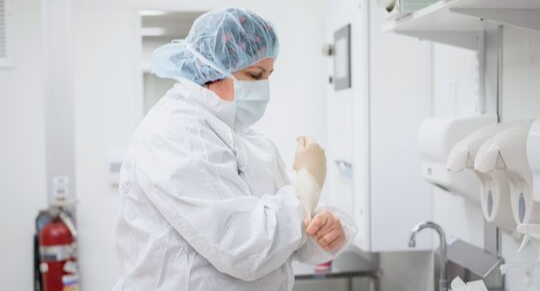Pharmacy Employers Cite Safety Benefits of Employing PTCB-Certified Compounded Sterile Preparation Technicians (CSPTs™)
More Than 550 Technicians Have Earned the CSPT™ Credential as Number Grows
 |
March 28, 2019
WASHINGTON, DC -- The Pharmacy Technician Certification Board (PTCB), the nation’s leading certifying body for pharmacy technicians, announces that after administering over 800 Compounded Sterile Preparation Technician™ (CSPT™) Exams, more than 550 pharmacy technicians have completed all steps to earn their CSPT™ Certification. CSPT Certification demonstrates a technician’s knowledge and skill in preparing medications in a sterile environment to prevent contamination, such as those administered through intravenous (IV) injection or infusion, including chemotherapy, immunotherapy, and ophthalmics. Pharmacy technicians are regularly responsible for preparation of compounded sterile products. Only PTCB-Certified Pharmacy Technicians (CPhTs) in good standing may apply to become Certified Compounded Sterile Preparation Technicians (CSPTs).
“Pharmacists have a responsibility to best serve their patients and ensure their safe access to medications,” said William Schimmel, PTCB Executive Director and CEO. “They know CSPTs have the knowledge and skills necessary to prepare sterile products safely. Employers tell us they want CSPTs on their pharmacy teams to advance medication safety, and also to build employee engagement and commitment.”
According to Schimmel, the CSPT Program, launched in December 2017, is a useful tool that pharmacy managers can use to establish career ladders for technicians. “Employers who build career paths for technicians to pursue their CSPT say their employees demonstrate a growing pride in their work and a greater allegiance to a career in pharmacy.”
At Baptist Memorial Hospital Pharmacy in Memphis, where more than 500 sterile preparations are generated each day, the CSPT Program has proven beneficial, according to Andreece Gandy, PharmD, MBA, Pharmacy Operations Manager. “The more opportunities we give our technicians to advance, the better chance we have to retain motivated and dedicated technicians in our city. Due to our high volume, we seek tools that advance technicians’ knowledge and skills in sterile preparations. After some research, we found CSPT is an excellent tool to accomplish this,” Gandy said. “Not only does CSPT push our technicians to study and become more knowledgeable, but it is important in advancing technician roles in the department.”
Pharmacists report that CSPT-Certified technicians are valuable for compliance with USP Chapter <797> sterile compounding standards, which are designed to ensure patient benefit and reduce risk of contamination, infection, or incorrect dosing. “Technicians with a CSPT will have a better perspective on safety standards and are therefore more conscientious,” said Cindy Chan, PharmD, Pharmacy Operations Manager at Providence Infusion and Pharmacy Services in Tukwila, WA. “The CSPT Certification also shows they have an in-depth understanding of USP <797> standards that protect patients. As we incorporate this certification into a career ladder, we expect the majority of technicians will want to become CSPTs.”
Joan Williams, CPhT, CSPT, Pharmacy Technician Supervisor at Carilion Clinic Pharmacy of New River Valley in Christiansburg, VA says CSPTs in her clinic are dedicated to USP <797> compliance. “I highly encourage our experienced technicians to complete their CSPT credential, and be as proud as I am of the designation. CSPT Certification identifies those technicians who have a deep understanding of, and dedication to, sterile compounding and compliance with USP,” said Williams.
PTCB offers an optional sponsorship system for employers to pay their employees’ exam fees. Pharmacy employers say they choose to pay test fees as a way to advance safety. “As a manager, we are happy to cover the cost of the CSPT Exam for our technicians to advance safety,” said Darren Jones, PharmD, Department of Pharmacy Manager at Carilion. “Also, I am working to get a monetary bonus for technicians who obtain and maintain this certification.”
According to a 2016 survey of public perceptions about pharmacies conducted by KRC Research*, 88% of the public say it is very important for people who compound or mix medications to be specially trained and certified. “PTCB’s work in the direction of having specialty certifications like CSPT is beneficial to the nation’s health care system,” added Williams.
To be eligible to apply for CSPT Certification, a PTCB CPhT must have completed either: a PTCB-recognized sterile compounding education/training program and one year of sterile preparation work experience; or 3 years of continuous sterile preparation work experience. Eligible CPhTs must pass the two-hour, 75-question CSPT Exam and submit a competency attestation from a qualified supervisor to earn CSPT Certification. The CSPT Program requires annual continuing education and recertification to maintain current knowledge in the field. PTCB established the CSPT Program in December 2017.
Details are available at ptcb.org/cspt.
___
*KRC Research conducted this quantitative survey in 2016 among adults ages 18 and above with demographic quotas to match the US adult population.
- Categories
- News Release
- CSPT
- Certificates
- Research